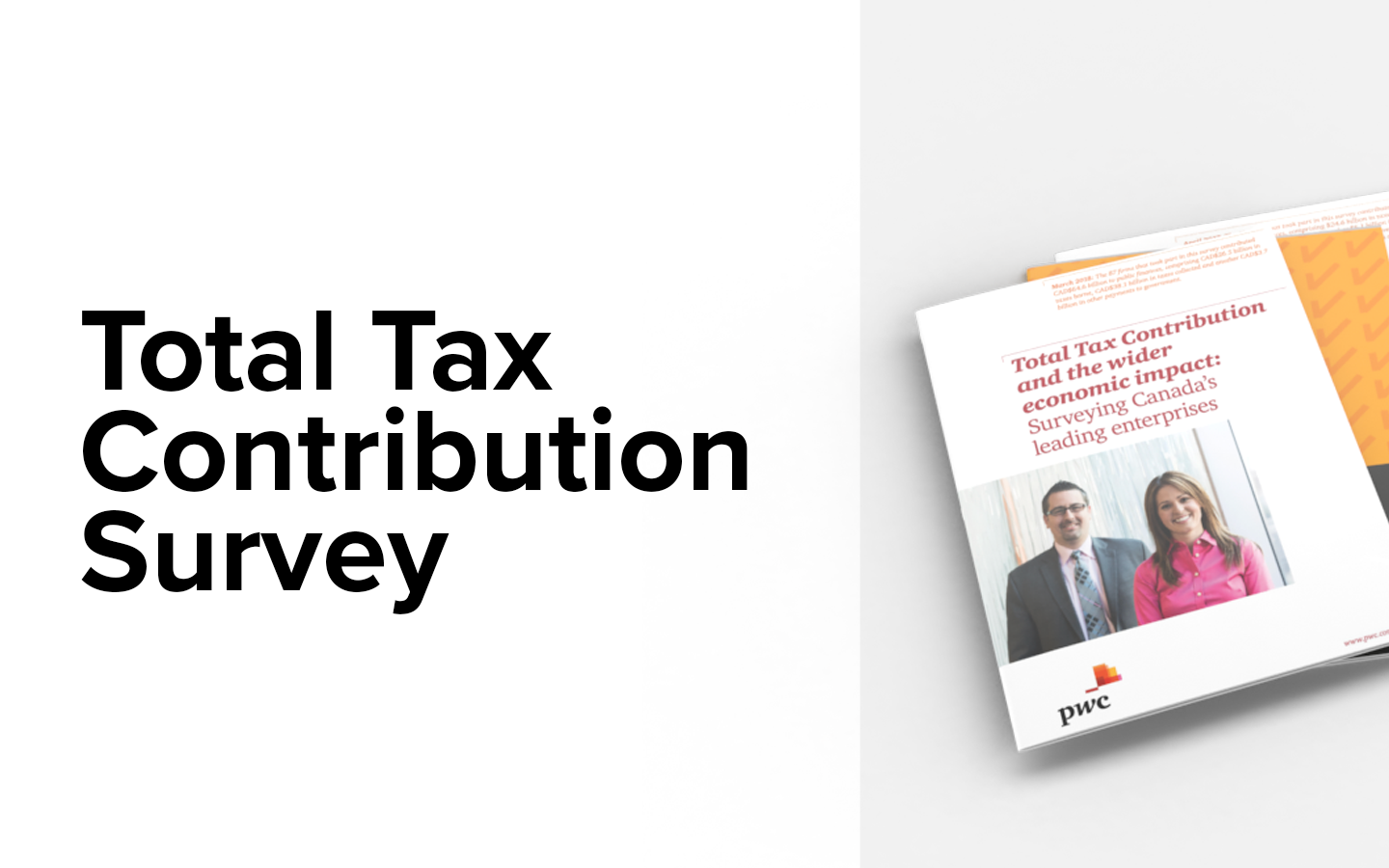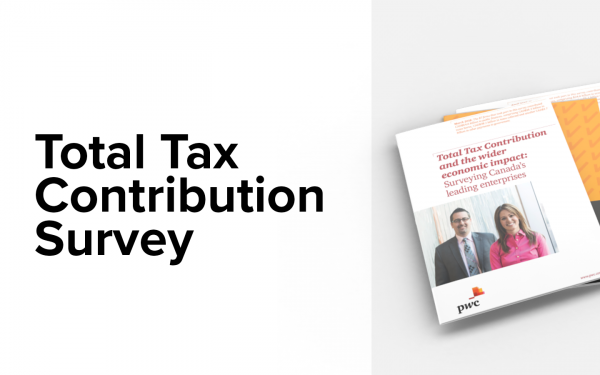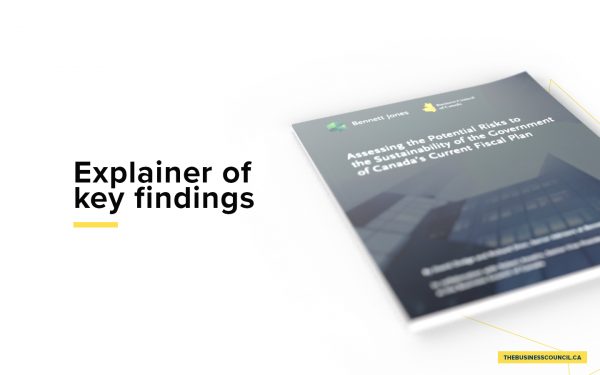Second Annual Total Tax Contribution Survey
Surveying Canada’s leading enterprises
Executive Summary
The purpose of the survey is to show the tax contribution of large businesses to public finances in Canada and provide insight into the complexity of the tax system.
The Total Tax Contribution survey of CEO Council members has attracted a large number of participants. Eighty companies took part in the survey, providing data on their largest Canadian taxes borne and collected in the accounting year to 31 December 2013. The high participation level demonstrates the value for companies in preparing and understanding their TTC data.
The survey uses the PwC Total Tax Contribution methodology, which looks at all the different taxes that companies pay and administer. The Total Tax Contribution includes both the taxes borne by a company (taxes which are a cost to the business) and taxes they collect. Taxes collected are not a direct cost of the business but are administered on behalf of the government.
The Total Tax Contribution
Eighty participants made a significant contribution to the Canadian economy. They contributed $58.2bn to all levels of government, comprising of $23.5bn in taxes borne and $34.7bn in taxes collected. The participants also paid an additional $6.2bn in other payments to government. Corporate income tax is the largest tax borne by the participants. In 2013, these companies paid a total of $7.1bn in federal corporate income tax or 19.4% of federal corporate income tax receipts.
The survey collected data on sixty-eight Canadian taxes and other payments to government. On average, for every $1 of corporate income tax paid, there was another $1.01 in other taxes borne such as employment taxes paid by the employer, irrecoverable sales taxes (GST, HST, QST, PST) paid on business inputs, and property taxes paid on property, $0.53 in other payments to government, and $2.97 in taxes collected such as people taxes collected from employees.
People taxes are the largest element of the Total Tax Contribution by percentage for the participants, accounting for 38.3% in the survey. This is followed by product taxes of 31.9%, and profit taxes of 22.3%.
The complexity of the tax system
A good tax system raises revenue to fund public expenditure and at the same time minimizes the administrative burden on business. The federal tax system collects 61% of the tax revenue from only a third of the number of taxes for the survey participants. The eighty companies contributed $35.4bn in Total Tax Contribution (including $11.6bn of taxes borne and $23.8bn of taxes collected) to the federal government in 2013.
The survey also collected data on the cost of complying with the tax legislation. Tax compliance activities include preparing tax figures, completing and filing tax returns and paying taxes. On average, participants have seventeen full time equivalent employees working on Canadian tax compliance. For all taxes, the cost on average is 0.4% of their taxes borne, effectively representing an additional cost of doing business.
Putting the Total Tax Contribution data in context
The average Total Tax Rate (TTR) for the eighty companies in the survey is 33.9%. The Total Tax Rate measures the cost of all the different taxes borne against profitability.
Government takes the largest share of the total value distributed by the eighty study participants in the Total Tax Contribution survey. The companies paid 39.9% of their value distributed to government in the form of taxes borne, taxes collected and other payments to government, 32.2% went to shareholders or was retained for reinvestment, among which 12.6% went to shareholders as dividends or share repurchase and 19.6% was retained for reinvestment, and 27.9% went to employees.
The companies taking part in the survey are large Canadian employers. Employment is a major way in which companies contribute to the economy. They employed 1,013,977 employees1 in 2013 with total employment taxes borne and collected of $22.3bn. The jobs that the participants created, and the employment taxes that were paid in respect of those jobs, are an important part of their contribution to the economy.
The survey participants employ skilled, well paid workers. They paid an average wage of $63,068 and employment taxes of $21,981 per employee. This is a measure of the taxes directly generated through jobs created by these large employers.
Foreword
Welcome to the second annual Total Tax Contribution survey for the Canadian Council of Chief Executives (CEO Council). This survey collected data from 80 of Canada’s largest businesses, representing a range of industry sectors for the fiscal year 2013. Participation grew by 27% (17 members), reflecting increasing corporate interest in tax transparency.
The survey results can inform ongoing dialogue about Canadian tax policy by shedding light on all contributions to all three levels of government in Canada.
Results show that the 80 participating CEO Council members are significant taxpayers, responsible for nearly 20% of all federal corporate tax revenue. In fact, the three levels of government together are the biggest beneficiary of payments from participating members (39.9%). Employees received 27.9% in the form of net-of-tax payroll compensation, 19.6% was retained for reinvestment in their businesses, and 12.6% was distributed to shareholders.
The Total Tax Contribution for the participants in 2013 was $58.2 billion: $23.5 billion in taxes borne and $34.7 billion in taxes collected. A further $6.2 billion in other payments, such as royalties, were made. Increased participation raised the Total Tax Contribution by $17.6 billion over the prior year.
Corporate income taxes are only one part of companies’ contributions to public finances. For every $1 of corporate income tax paid, participating businesses paid an additional $1.01 in other business taxes and $0.53 in other payments to government. The average total tax rate is 33.9%, calculated as all taxes borne by a particular business divided by Canadian accounting profit before all taxes borne.
Beyond tax, the survey collects data about total employment numbers, compensation and the cost of tax compliance. Tax compliance costs remain a burden to businesses. The survey identified 68 types of taxes and other payments contributed to the three levels of government. To comply, the 80 participating members spent $3.9 million and maintained 17 full-time employees on average.
PwC thanks the CEO Council for their continuing support. The Canadian tax system must remain internationally competitive to help generate new, job creating investment in Canada. We hope that the results of this survey will help support ongoing discussions about Canadian tax policy, complexity and competitiveness.
Lincon Schreiner, PwC Canada
Andrew Packman, PwC UK
About
CEO Council
The Canadian Council of Chief Executives (CEO Council) is a not‑for‑profit, non‑partisan organization composed of the CEOs of Canada’s leading enterprises. The CEO Council engages in an active program of public policy research, consultation and advocacy. The CEO Council is a source of thoughtful, informed comment from a business point of view on issues of national importance to the economic and social fabric of Canada. CEO Council members represent all sectors of the Canadian economy. The companies they lead collectively administer $6 trillion in assets, have annual revenues in excess of $850 billion, and are responsible for the vast majority of Canada’s exports, investment, research and development, and training.
PwC
PwC Canada helps organizations and individuals create the value they’re looking for. Our 5,700 partners and staff in offices across the country are committed to delivering quality in assurance, tax, consulting and deals services. PwC Canada is a member of the PwC network of firms with more than 195,000 people in 157 countries
Total Tax Contribution
The Total Tax Contribution methodology identifies taxes borne and taxes collected. Taxes borne by a company are a cost to the company and reflected in its financial results, e.g. federal and provincial corporate income (profit) tax and irrecoverable sales taxes.
Taxes collected are those generated by a company’s operations, but which do not affect its results, e.g. payroll taxes withheld from employees and remitted and GST/HST collected from customers and remitted.
We identified 68 business taxes and other payments to governments in this survey under the Total Tax Contribution methodology. Taxes are categorized into five tax bases, i.e. profit taxes, production taxes, employment taxes, property taxes and environmental taxes.











